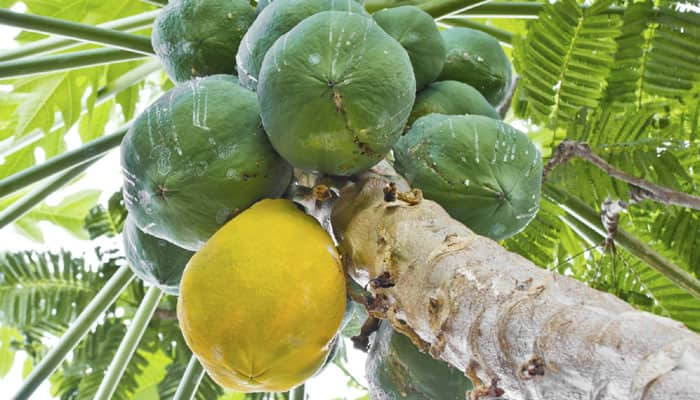Zee Media Bureau
New Delhi: The use of papaya leaves has grown phenomenally in the national capital in the past few weeks as the mosquito-borne disease sees a spurt, claiming at least 17 lives in the city, although unofficially the number stands at over 20.
And the total number of people suffering from dengue fever has climbed to 3,791 so far. Out of the total number of cases reported till 19 September, at least 2,960 of them were recorded this month only.
Also Read: Signs and symptoms of dengue fever
With no specific drug to prevent the dreaded vector-borne disease, people are continuously turning to natural home remedies. One such common remedy is papaya leaves.
The leaves, which are said to increase dipping platelet counts, are a much sought after product these days in Delhi nurseries and that papaya leaves have been disappearing from various localities.
Also Read: Dengue breakthrough - Bengaluru-based lab develops botanical pill
“There are many people who come to buy the papaya plant,” Vikram Saini, director of the Masjid Nursery at Pandara Road in south Delhi, was quoted as saying to IANS.
“We are getting a lot of queries. We have ample stocks,” Saini added.
Also Read: What dengue can do to your body
YC Singh of Greenways Nursery at Lado Sarai also said that at least 20-25 people come in a week to buy papaya plants.
“We sell a papaya seedling for Rs. 20, and the plant for Rs. 25,” he said.
Doctors said there are no scientific studies to prove that papaya plant leaves can cure dengue or increase the blood platelet count.
Also Read: Home remedies for dengue
According to SP Byotra of Sir Ganga Ram Hospital, 95 percent of dengue patients recover on their own as it is a self-limiting disease. “It is only in five percent cases when patients suffer from hemorrhagic dengue fever or dengue shock syndrome that they have to be treated for a dipping platelet count,” he added.
Patients, however, say they have found immense benefit from papaya leaves.
The leaves of papaya are first boiled and then crushed to extract the juice, which is subsequently drunk.
Preeti Chabra, senior consultant (Ayurveda) at Sir Ganga Rama Hospital, said she had come across many people who are taking the juice of papaya leaves. While this looks like a new phenomenon, she said that it's not mentioned in the classical Ayurvedic text.
Meanwhile, recently a pill made of papaya leaf extract has been found to be effective in treating dengue patients.
Developed by a Bengaluru-based lab, Micro Labs, the pill 'Caripill' is the first drug to be backed by adequate scientific data to increase the platelet count in dengue cases.
Dengue symptoms include fever, headache, muscle and joint pain - and a skin rash that is similar to measles. In a small proportion of cases, the disease develops into the life-threatening dengue hemorrhagic fever, resulting in bleeding, low levels of blood platelets and blood plasma leakage, or dengue shock syndrome, characterised by dangerously low blood pressure.
Interestingly, papaya leaf has also been found to possess powerful anti-malarial and anti-cancerous properties. And in some parts of the world, papaya leaf extract is used as a prophylactic to prevent malaria in endemic regions.
Also, as per a research published in the Journal of Ethnopharmacology in 2010, researchers from the US and Japan found that enzymes found in papaya leaf have dramatic cancer fighting properties against a wide range of tumours including cervical cancer, breast cancer, liver cancer, lung cancer, and pancreatic cancer.
















